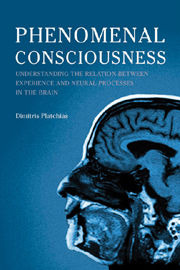Book contents
- Frontmatter
- Contents
- Acknowledgements
- Miscellaneous Frontmatter
- Introduction
- 1 The nature of the mind
- 2 Phenomenal consciousness: the hard problem
- 3 Phenomenal consciousness and the “sufficiency” claim
- 4 Experience and first-order representationalism
- 5 Experience and the explanatory gap
- 6 Experience and higher-order representationalism
- Notes
- Bibliography
- Index
6 - Experience and higher-order representationalism
- Frontmatter
- Contents
- Acknowledgements
- Miscellaneous Frontmatter
- Introduction
- 1 The nature of the mind
- 2 Phenomenal consciousness: the hard problem
- 3 Phenomenal consciousness and the “sufficiency” claim
- 4 Experience and first-order representationalism
- 5 Experience and the explanatory gap
- 6 Experience and higher-order representationalism
- Notes
- Bibliography
- Index
Summary
HIGHER-ORDER REPRESENTATIONALISM
In the previous chapters we saw that there is good reason to think that mental qualitative properties are explanatorily irrelevant to experience or what-it-is-likeness. Further, we cannot come up with the required explanation for experience by appealing to any number of physical properties of neural states. Thus we should attempt a different explanatory strategy. Since consciousness is what makes mental states experiences – that is, such that there is something it is like for one to be in them – it could itself be a mental phenomenon, and since, as we saw previously, dispositionalism falls short of providing the required explanation, we need to appeal to actualist theories of consciousness.
Higher-order representationalist theories of consciousness hold that first-order representation does not suffice to account for the distinction between conscious and unconscious states. The answer to the question “What makes or transforms an unconscious mental state into a conscious one?” is, typically, some (higher-order) awareness of the state in question. According to higher-order representationalism (HOR), a state is a conscious state just in case it is or is disposed to be the object of a higher-order mental state. The latter is a state that represents or is about the lower (first-order) state, which is generally thought of as a perceptual or quasi-perceptual state.
There are several versions of HOR. The higher-order state – that is, the awareness required – can be a thought about the first-order state (HOT theory; e.g. Rosenthal 1991) or a kind of perception of the first-order state (Lockean or inner-sense theory; Lycan 1996). On both higher-order thought (HOT) and higher-order perception (HOP) accounts, that a mental state is conscious is a relational fact, requiring some additional mental state representing the first-order state in a suitable way.
- Type
- Chapter
- Information
- Phenomenal ConsciousnessUnderstanding the Relation between Neural Processes and Experience, pp. 147 - 180Publisher: Acumen PublishingPrint publication year: 2010



